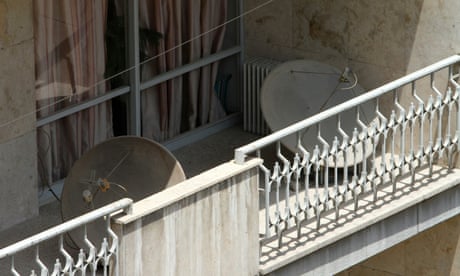BBC appeals to UN over Iran’s crackdown on journalists
Corporation complains of ‘sustained campaign of harassment’ after assets of BBC Persian staff are frozen
 Fardad Farahzad, a presenter for BBC Persian, prepares to read the news. Photograph: Simon
Fardad Farahzad, a presenter for BBC Persian, prepares to read the news. Photograph: Simon
Saeed Kamali Dehghan Iran correspondent
Wednesday 25 October 2017 11.02 EDTLast modified on Wednesday 25 October 2017 17.00 EDT
The BBC’s director general has accused Iran of “unprecedented collective punishment” as the corporation appealed to the UN over crackdowns on Iranian employees of its London-based Persian service.
Iranian authorities have imposed an asset freeze on at least 152 BBC Persian journalists and former contributors, preventing them from conducting financial transactions or selling properties in their homeland because of their affiliation with the British broadcaster.
It has emerged that a criminal investigation has also been launched in Iran, accusing those linked with BBC Persian of “conspiracy against national security”. The corporation said it was the latest “sustained campaign of harassment and persecution ... designed to pressure journalists against continuing their work for the BBC”.Acting on behalf of its London-based Persian service staff, the BBC has filed an urgent complaint with David Kaye, the UN special rapporteur on the promotion and protection of the right to freedom of opinion and expression. It has also contacted Asma Jahangir, the UN special rapporteur on human rights in Iran, who was expected to issue a statement on Wednesday.

Iran freezes assets of BBC Persian staff in crackdown on journalists
Tony Hall, the BBC director general, said the Iranian investigation appeared to be politically motivated.
“This is an unprecedented collective punishment of journalists who are simply doing their jobs,” he said. “This is not just a campaign against BBC Persian staff but against fundamental human rights, and the BBC calls on the government of Iran to end this legal action immediately.”
The National Union of Journalists in the UK also condemned the harassment of BBC Persian journalists.
“These ludicrous charges amount to the collective punishment of journalists and a crass attempt to intimidate,” said Michelle Stanistreet, the general secretary. “Iran should drop the criminal charges and lift the asset ban immediately.”
Advertisement
About 140 employees work for BBC Persian from outside Iran. The TV channel, which is broadcast from London, is loathed by the Iranian establishment and banned inside Iran, but millions of people, hungry for news not reported by the state-run channels, watch it via illegal satellite dishes.
Iran has launched a campaign of harassment against BBC Persian staff by summoning their family members who live in the country for questioning.
A number of employees have also been victims of false allegations of sexual misconduct, duplicated Facebook accounts, fake blogs and online identity theft designed to discredit them.
In one case, the sister of a BBC Persian journalist was taken to Evin prison in Tehran, held there for 17 days and “forced to plead with the journalist via Skype to stop working for the BBC or spy on colleagues”.
Britain is often called the “old fox” by Iranian hardliners, who consider BBC Persian to be a subversive arm of MI6, aimed at fomenting regime change in Iran.
The BBC World Service, which controls the foreign language services, received funding until 2014 from the Foreign Office – a factor that has fanned the Iranian establishment’s distrust.
Britain must do more to bring Nazanin Zaghari-Ratcliffe back from Iran
Shirin Ebadi
Read more
Historical suspicions date back to the 1941 Anglo-Soviet invasion of Iran, and later to the still unacknowledged MI6-engineered coup against the country’s first democratically elected prime minister, Mohammad Mossadegh, who had nationalised the Anglo-Iranian oil company.
The ongoing imprisonment of Nazanin Zaghari-Ratcliffe, a British-Iranian woman serving a five-year jail sentence in Iran, is linked to her previous work for the BBC. Tehran’s prosecutor general, in comments made earlier this month, alleged that she was running “a BBC Persian online journalism course aimed at recruiting and training people to spread propaganda against Iran”. Zaghari-Ratcliffe worked for BBC Media Action between February 2009 and October 2010.
“The BBC, on behalf of its staff, will use all available legal avenues to challenge this order,” Hall vowed, urging the international community to “use their own influence in Iran to persuade the authorities that this completely unacceptable treatment must end”.
BBC Persian journalists cannot visit their families in Iran for fear of reprisal.
Since you’re here …
… we have a small favour to ask. More people are reading the Guardian than ever but advertising revenues across the media are falling fast. And unlike many news organisations, we haven’t put up a paywall – we want to keep our journalism as open as we can. So you can see why we need to ask for your help. The Guardian’s independent, investigative journalism takes a lot of time, money and hard work to produce. But we do it because we believe our perspective matters – because it might well be your perspective, too.
I appreciate there not being a paywall: it is more democratic for the media to be available for all and not a commodity to be purchased by a few. I’m happy to make a contribution so others with less means still have access to information.Thomasine F-R.
If everyone who reads our reporting, who likes it, helps fund it, our future would be much more secure. For as little as $1, you can support the Guardian – and it only takes a minute. Thank you.
Corporation complains of ‘sustained campaign of harassment’ after assets of BBC Persian staff are frozen
 Fardad Farahzad, a presenter for BBC Persian, prepares to read the news. Photograph: Simon
Fardad Farahzad, a presenter for BBC Persian, prepares to read the news. Photograph: SimonSaeed Kamali Dehghan Iran correspondent
Wednesday 25 October 2017 11.02 EDTLast modified on Wednesday 25 October 2017 17.00 EDT
The BBC’s director general has accused Iran of “unprecedented collective punishment” as the corporation appealed to the UN over crackdowns on Iranian employees of its London-based Persian service.
Iranian authorities have imposed an asset freeze on at least 152 BBC Persian journalists and former contributors, preventing them from conducting financial transactions or selling properties in their homeland because of their affiliation with the British broadcaster.
It has emerged that a criminal investigation has also been launched in Iran, accusing those linked with BBC Persian of “conspiracy against national security”. The corporation said it was the latest “sustained campaign of harassment and persecution ... designed to pressure journalists against continuing their work for the BBC”.Acting on behalf of its London-based Persian service staff, the BBC has filed an urgent complaint with David Kaye, the UN special rapporteur on the promotion and protection of the right to freedom of opinion and expression. It has also contacted Asma Jahangir, the UN special rapporteur on human rights in Iran, who was expected to issue a statement on Wednesday.

Iran freezes assets of BBC Persian staff in crackdown on journalists
Tony Hall, the BBC director general, said the Iranian investigation appeared to be politically motivated.
“This is an unprecedented collective punishment of journalists who are simply doing their jobs,” he said. “This is not just a campaign against BBC Persian staff but against fundamental human rights, and the BBC calls on the government of Iran to end this legal action immediately.”
The National Union of Journalists in the UK also condemned the harassment of BBC Persian journalists.
“These ludicrous charges amount to the collective punishment of journalists and a crass attempt to intimidate,” said Michelle Stanistreet, the general secretary. “Iran should drop the criminal charges and lift the asset ban immediately.”
Advertisement
About 140 employees work for BBC Persian from outside Iran. The TV channel, which is broadcast from London, is loathed by the Iranian establishment and banned inside Iran, but millions of people, hungry for news not reported by the state-run channels, watch it via illegal satellite dishes.
Iran has launched a campaign of harassment against BBC Persian staff by summoning their family members who live in the country for questioning.
A number of employees have also been victims of false allegations of sexual misconduct, duplicated Facebook accounts, fake blogs and online identity theft designed to discredit them.
In one case, the sister of a BBC Persian journalist was taken to Evin prison in Tehran, held there for 17 days and “forced to plead with the journalist via Skype to stop working for the BBC or spy on colleagues”.
Britain is often called the “old fox” by Iranian hardliners, who consider BBC Persian to be a subversive arm of MI6, aimed at fomenting regime change in Iran.
The BBC World Service, which controls the foreign language services, received funding until 2014 from the Foreign Office – a factor that has fanned the Iranian establishment’s distrust.
Britain must do more to bring Nazanin Zaghari-Ratcliffe back from Iran
Shirin Ebadi
Read more
Historical suspicions date back to the 1941 Anglo-Soviet invasion of Iran, and later to the still unacknowledged MI6-engineered coup against the country’s first democratically elected prime minister, Mohammad Mossadegh, who had nationalised the Anglo-Iranian oil company.
The ongoing imprisonment of Nazanin Zaghari-Ratcliffe, a British-Iranian woman serving a five-year jail sentence in Iran, is linked to her previous work for the BBC. Tehran’s prosecutor general, in comments made earlier this month, alleged that she was running “a BBC Persian online journalism course aimed at recruiting and training people to spread propaganda against Iran”. Zaghari-Ratcliffe worked for BBC Media Action between February 2009 and October 2010.
“The BBC, on behalf of its staff, will use all available legal avenues to challenge this order,” Hall vowed, urging the international community to “use their own influence in Iran to persuade the authorities that this completely unacceptable treatment must end”.
BBC Persian journalists cannot visit their families in Iran for fear of reprisal.
Since you’re here …
… we have a small favour to ask. More people are reading the Guardian than ever but advertising revenues across the media are falling fast. And unlike many news organisations, we haven’t put up a paywall – we want to keep our journalism as open as we can. So you can see why we need to ask for your help. The Guardian’s independent, investigative journalism takes a lot of time, money and hard work to produce. But we do it because we believe our perspective matters – because it might well be your perspective, too.
I appreciate there not being a paywall: it is more democratic for the media to be available for all and not a commodity to be purchased by a few. I’m happy to make a contribution so others with less means still have access to information.Thomasine F-R.
If everyone who reads our reporting, who likes it, helps fund it, our future would be much more secure. For as little as $1, you can support the Guardian – and it only takes a minute. Thank you.
Comments
Post a Comment